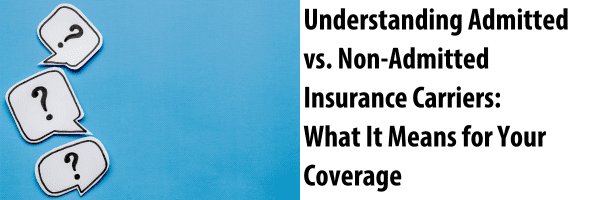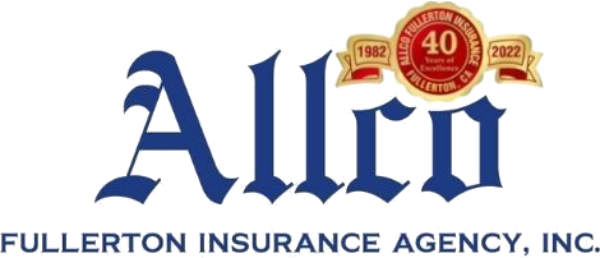
In the insurance industry, terms like “admitted” and “non-admitted” often come up, especially when discussing coverage options. These classifications primarily refer to whether or not an insurance carrier is licensed and regulated by the state where it operates, affecting everything from consumer protections to rate flexibility. Here’s what you need to know to make informed choices about your insurance coverage.
Admitted Insurance Carriers
Licensing and Regulation: Admitted insurance carriers are licensed by the state’s insurance department, meaning they’ve passed rigorous checks related to financial stability, consumer protection, and compliance with state laws. These regulations ensure that the company can meet its obligations and provides peace of mind to policyholders.
Consumer Protections: Policies from admitted carriers come with a key benefit—access to state guaranty funds. These funds serve as a safety net, offering policyholders a layer of financial protection if the insurer becomes insolvent. For many clients, this feature adds a level of security that can be particularly valuable.
Rate Regulation: Admitted insurers must have their rates and forms approved by the state, which helps standardize their products. While this can mean slightly less flexibility, it also assures policyholders of predictable coverage options that have undergone state review.
Non-Admitted Insurance Carriers
Licensing Flexibility: Non-admitted carriers, also known as surplus lines insurers, are not licensed within the state where they operate. They are often called upon to cover high-risk or unique insurance needs that admitted carriers may decline. This means these insurers often fill a crucial role by offering options for businesses and individuals with specialized requirements.
Coverage Flexibility: Without the same state regulations, non-admitted carriers have greater flexibility with underwriting and pricing. This enables them to cater to unique or high-risk markets, offering coverage for situations that admitted insurers may consider too risky or unconventional.
Limited Consumer Protections: While non-admitted carriers provide specialized coverage, they do not come with the same state-backed protections as admitted insurers. Notably, policyholders cannot rely on state guaranty funds if the insurer faces financial difficulties. This is why working with a reputable non-admitted carrier—ideally one with a high A.M. Best rating—is essential.
The Role of A.M. Best Ratings
When choosing an insurance carrier, particularly if it's a non-admitted one, checking the carrier’s financial stability is vital. This is where A.M. Best, a leading global credit rating agency, comes into play.
Understanding the Rating Scale: A.M. Best uses a letter grading system, from A++ (Superior) to D (Poor). Higher ratings, such as A or A++, reflect a strong ability to meet ongoing insurance obligations, whereas lower ratings signal greater financial risk. You can research an insurer’s rating on A.M. Best’s website at www.ambest.com.
Why A.M. Best Ratings Matter:
- Financial Stability: High ratings indicate financial stability, giving consumers confidence that the insurer can fulfill its policyholder obligations.
- Market Confidence: Insurers with strong ratings are often preferred by brokers, clients, and investors, enhancing the appeal and trust in their offerings.
- Regulatory Compliance: Some states mandate minimum ratings from A.M. Best for insurers to meet specific regulatory requirements, ensuring only financially secure carriers operate in the market.
- Informed Decision-Making: Consumers can use A.M. Best ratings to compare carriers, making it easier to choose an insurance provider with a strong track record.
Admitted or Non-Admitted? Making the Right Choice for Your Needs
When selecting between admitted and non-admitted carriers, both options are perfectly viable, depending on your unique needs and risk profile. If choosing a non-admitted carrier, ensure they have a strong A.M. Best rating (preferably no less than an “A”) to ensure you’re getting the stability and reliability needed for peace of mind. If you have more questions, call us at 714-992-2390, we'd love to discuss it with you.

